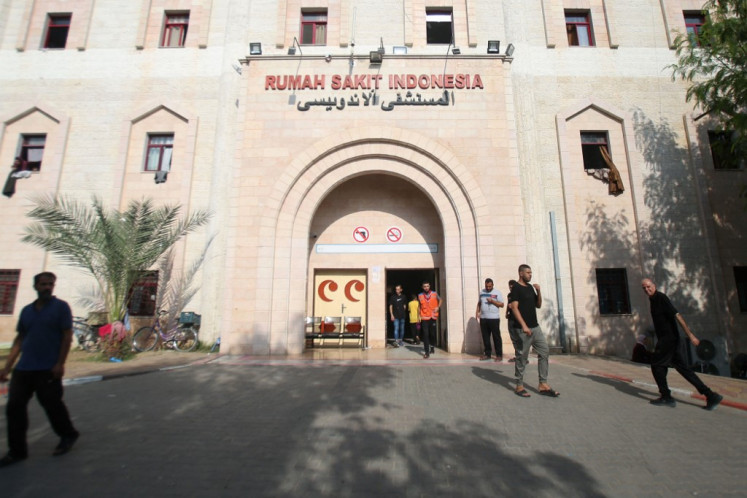Popular Reads
Top Results
Can't find what you're looking for?
View all search resultsPopular Reads
Top Results
Can't find what you're looking for?
View all search resultsThe elusive demographic bonus – boon or bust?
Could it be that young people who see their prosperity at the lower rank of the ladder have no choice but to be optimistic? OK, whatever the reason may be, being optimistic is definitely a valuable asset to count on. On the other hand, this optimism is begging for an avenue to channel it to get a pay off. And here Jakarta failed miserably.The second area questioned whether there were sufficient opportunities for education and training. Opportunity means availability and accessibility. Jakarta ranked 28th among the 35 cities, just above Bogota and below Buenos Aires. That will be the first barrier to break if the optimism is to turn into positive energy for growth.
Change text size
Gift Premium Articles
to Anyone
I
ndonesia will start aging in 2030. Amid the euphoric rhetoric about how wonderful it is to have a demographic bonus peaking in 2025, the statistical facts that the window of its benefit is logically finite seem to be less understood.
Worse still, the mega-task to be undertaken to realize its benefit within this narrow window is equally less campaigned.
Will it, like other golden opportunities missed in the past, be another repeat?
The energy promised by the burgeoning young workforce resulting from the natural and policy driven development is in fact that a promise, just like the availability of billions of seeds of trees that carry the promise to reforest the badly deforested tropical forest, remains a promise.
Massive strategic and tactical work needs to be done to make it happen and actually work.
In a recent gathering convened by Indonesia Business Links in Jakarta, 2015 global research by the Economist Intelligence Unit (EIU) and commissioned by Citi Foundation in January-April 2015 was discussed. The research covered the youth of 35 important cities in the world, crisscrossing from Toronto to Sydney, from Tokyo to Buenos Aires covering all continents, and Jakarta was on the list. The result was eye opening.
Covering five broad areas of concerns, the picture of the first area sounds like a big morale booster: of the 35 cities covered Jakarta ranked fifth in terms of its youth’s optimism on the future of their wellbeing and ability to thrive.
Further analysis of this score, however, was sobering — the high optimism scores were recorded on the lowest gross domestic product (GDP)/capita cities.
Could it be that young people who see their prosperity at the lower rank of the ladder have no choice but to be optimistic? OK, whatever the reason may be, being optimistic is definitely a valuable asset to count on. On the other hand, this optimism is begging for an avenue to channel it to get a pay off. And here Jakarta failed miserably.
The second area questioned whether there were sufficient opportunities for education and training. Opportunity means availability and accessibility. Jakarta ranked 28th among the 35 cities, just above Bogota and below Buenos Aires. That will be the first barrier to break if the optimism is to turn into positive energy for growth.
The next area to lay their hope to is the strength of human and social capital. It is generally understood that when human and social capital is strong the community will have a collective strength to weather the bad, like the aftermath of a disaster and other calamities.
But here Jakarta does not fare well either — 29th, between Mumbai at 28th and Panama City at 30th. With such low human and social capital, our youth are facing difficulties relatively alone. Not helpful at all to convert optimism to real prosperity.
Moving on to the fourth area that involves the government — the level of government’s support to the youth — unfortunately again Jakarta ranked 33rd, just above Lagos and below Kuala Lumpur. Whatever the government has done, our youth don’t perceive it as either sufficient or appropriate. This is then topped by the fifth criteria, which is the availability of employment and entrepreneurial opportunities, which puts Jakarta 34th, only above Buenos Aires.
These five areas of concern are staged on some big global trends and facts. Some 47 percent of the youth in those cities recently migrated from rural to urban areas. The cities are the terminal hope for them to improve their wellbeing, a desperate choice only to find an unhelpful place. This number was also confirmed by a Central Statistics Agency (BPS) report from a 2011-2014 survey.
Moreover, the Indonesian statistics also confirm the EIU research in terms of the fact that urban youth unemployment percentage is way above the overall unemployment percentage at 24.24 percent versus 7.12 percent, 3.40 times higher than overall.
It may be an oversimplified conclusion to say that while optimism is high, the avenue to convert the optimism to positive energy for economic growth is fraught with barriers.
Barriers which in many cases relates to factors that are fundamental to a country’s economic, social and environmental (hence political) sustainability, such as regulation, prioritization, policy and delivery of action.
To be fair, the research also compared cities within their GDP per capita peer group, and Jakarta is not always below the average of those. But in an interconnected world that is today, where demand and supply for quality workforce can come from anywhere, the opportunity to capitalize on the demographic bonus and realize it as a productive asset can quickly fade away.
Beyond that it can also turn into a dangerous liability. A liability where the disillusioned youth will be naturally incensed to channel their energy against the established law and order and, combined with the low human and social capital, become individuals prone to activities dangerous to world peace.
It was thus very encouraging that National Development Planning Minister Bambang Brodjonegoro, in his keynote speech, stated that the government was keenly aware of the challenges and would take the necessary steps to gain the collaboration of all stakeholders to address the issue at hand.
The minister concurred, the burgeoning energy that is statistically called demographic bonus is an elusive force — addressed properly it will be an asset critically demanded around the world to meet the needs of growth and the reality of aging; however treat it wrongly it will be a disaster in the making.
The stakes are high, as youth is the essence that stands at the heart of our independence and we don’t have much time to address it. It is for all of us to be aware and to address them collaboratively. Not a single stakeholder can solve it alone.
Beyond Jakarta, while the capital city is a small strong sample, Indonesia is a much bigger, diverse and definitely more complex challenge with status that is not better. Collaborative effort, wisely facilitated by widely accepted entity — the government will be the first choice, is a must and must be accelerated immediately.
Putting the issue below other important priorities risks the failure to address all those priorities with dignity — a dream that defines our independence.
***
The writer is co-founder and chairman of the board of patrons of Indonesia Business Links.
---------------
We are looking for information, opinions, and in-depth analysis from experts or scholars in a variety of fields. We choose articles based on facts or opinions about general news, as well as quality analysis and commentary about Indonesia or international events. Send your piece to community@jakpost.com. For more information click here.










